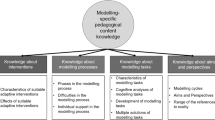Abstract
Teaching mathematical modelling is a cognitively challenging activity for (prospective) teachers. Thus, teacher education requires a detailed analysis of professional competence for teaching mathematical modelling. To measure this competence, theoretical models that accurately describe the requirements placed upon teachers are needed, as well as appropriate evaluation tools that adequately capture skills and abilities in this field. This is where the present study comes in, contributing to the teaching of mathematical modelling through the theory-based development of a structural model and an associated test instrument. In particular, this chapter discusses to what extent the proposed conceptualisation of the structural model can be empirically confirmed. To this end, insights into the test instrument are presented, as well as results of the structural equation analysis of the model.
Access this chapter
Tax calculation will be finalised at checkout
Purchases are for personal use only
Similar content being viewed by others
References
Baumert, J., & Kunter, M. (2013). The COACTIV model of teachers’ professional competence. In M. Kunter, J. Baumert, W. Blum, U. Klusmann, S. Krauss, & M. Neubrand (Eds.), Cognitive activation in the mathematics classroom and professional competence of teachers (pp. 25–48). New York: Springer.
Blum, W. (2015). Quality teaching of mathematical modelling: what do we know, what can we do? In S. J. Cho (Eds.), Proceedings of ICME12 (pp. 73–96). Cham: Springer.
Blömeke, S., Hsieh, F.-J., Kaiser, G., & Schmidt, W. (Eds.). (2014). International perspectives on teacher knowledge, beliefs and opportunities to learn. Dordrecht: Springer.
Blomhøj, M. (2019). Towards integration of modelling in secondary mathematics teaching. In G. A. Stillman & J. P. Brown (Eds.), Lines of inquiry in mathematical modelling (pp. 37–52). Cham: Springer.
Borromeo Ferri, R. & Blum, W. (2010). Mathematical modelling in teacher education—Experiences from a modelling seminar. In V. Durand-Guerrier, S. Soury-Lavergne & F. Arzarello (Eds.), Proceedings of CERME6 (pp. 2046–2055). Lyon, France.
Brunner, M., Anders, Y., Hachfeld, A., & Krauss, S. (2013). The diagnostic skills of mathematics teachers. In M. Kunter, J. Baumert, W. Blum, U. Klusmann, S.Krauss, & M. Neubrand (Eds.), Cognitive activation in the mathematics classroom and professional competence of teachers (pp. 229–248). New York: Springer.
Czocher, J. (2017). Modeling cycles as a task design heuristic. The Mathematics Enthusiast, 14(1), 129–140.
Galbraith, P., & Stillman, G. (2006). A Framework for identifying student blockages during transitions in the modelling process. ZDM—Mathematics Education, 38(2), 143–162.
Haines, C., & Crouch, R. (2001). Recognizing constructs within mathematical modelling. Teaching Mathematics and Its Applications, 20(3), 129–138.
Hattie, J. (2009). Visible learning. A synthesis of over 800 meta-analysis. London: Routledge.
Hu, L., & Bentler, P. M. (1998). Fit indices in covariance structure modeling: Sensitivity to underparameterized model misspecification. Psychological Methods, 3(4), 424–453.
Julie, C., & Mudaly, V. (2007). Mathematical modelling of social issues in school mathematics in South Africa. In W. Blum, P. Galbraith, H.-W. Henn, & M. Niss (Eds.), Modelling and applications in mathematics education: The 14th ICMI study (pp. 503–510). New York: Springer.
Kaiser, G., & Sriraman, B. (2006). A global survey of international perspectives on modelling in mathematics education. ZDM—Mathematics Education, 38(3), 302–310.
Klieme, E., Hartig, J., & Rauch, D. (2008). The concept of competence in educational contexts. In J. Hartig, E. Klieme, & D. Leutner (Eds.), Assessment of Competencies in Educational Contexts (pp. 3–22). Cambridge: Hogrefe Publishing.
Klock, H. & Wess, R. (2018). Lehrerkompetenzen zum mathematischen Modellieren. Münster: MIAMI. Retrieved from https://nbn-resolving.org/urn:nbn:de:hbz:6-35169679459.
Leiss, D., & Wiegand, B. (2005). A classification of teacher interventions. ZDM—Mathematics Education, 37(3), 240–245.
Maaß, K. (2010). Classification scheme for modelling tasks. Journal für Mathematik-Didaktik, 31(2), 285–311.
Maaß, K., & Gurlitt, J. (2010). Designing a teacher questionnaire to evaluate professional development in modelling. In V. Durand-Guerrier, S. Soury-Lavergne & F. Arzarello (Eds.), Proceedings of CERME6 (pp. 2056–2065). Lyon, France.
Mair, P., & Hatzinger, R. (2007). Extended rasch modeling. Journal of Statistical Software, 20(9), 1–20.
Neubrand, M., Jordan, A., Krauss, S., Blum, W., & Löwen, K. (2013). Task analysis in COACTIV: Examining the potential for cognitive activation in German mathematics classrooms. In M. Kunter, J. Baumert, W. Blum, U. Klusmann, S. Krauss, & M. Neubrand (Eds.), Cognitive activation in the mathematics classroom and professional competence of teachers (pp. 125–144). New York: Springer.
Rösken, B., & Törner, G. (2010). Epistemological aspects of beliefs. In F. Furinghetti & F. Morselli (Eds.), Proceedings of the conference MAVI-15 (pp. 111–120). Genoa, Italy.
Shulman, L. S. (1986). Those who understand. Educational Researcher, 15(2), 4–14.
Tschannen-Moran, M., & Woolfolk Hoy, A. (2001). Teacher efficacy: Capturing an elusive construct. Teaching and Teacher Education, 17(7), 783–805.
Voss, T., Kleickmann, T., Kunter, M., & Hachfeld, A. (2013). Mathematics teachers’ beliefs. In M. Kunter, J. Baumert, W. Blum, U. Klusmann, S. Krauss, & M. Neubrand (Eds.), Cognitive activation in the mathematics classroom and professional competence of teachers (pp. 249–271). New York: Springer.
Woolfolk Hoy, A., Davis, H., & Pape, S. J. (2006). Teacher knowledge and beliefs. In P. A. Alexander & P. H. Winne (Eds.), Handbook of educational psychology (pp. 715–737). Mahwah, N.J: Erlbaum.
Author information
Authors and Affiliations
Corresponding author
Editor information
Editors and Affiliations
Rights and permissions
Copyright information
© 2021 The Author(s), under exclusive license to Springer Nature Switzerland AG
About this chapter
Cite this chapter
Wess, R., Klock, H., Siller, HS., Greefrath, G. (2021). Measuring Professional Competence for the Teaching of Mathematical Modelling. In: Leung, F.K.S., Stillman, G.A., Kaiser, G., Wong, K.L. (eds) Mathematical Modelling Education in East and West. International Perspectives on the Teaching and Learning of Mathematical Modelling. Springer, Cham. https://doi.org/10.1007/978-3-030-66996-6_21
Download citation
DOI: https://doi.org/10.1007/978-3-030-66996-6_21
Publisher Name: Springer, Cham
Print ISBN: 978-3-030-66995-9
Online ISBN: 978-3-030-66996-6
eBook Packages: EducationEducation (R0)




